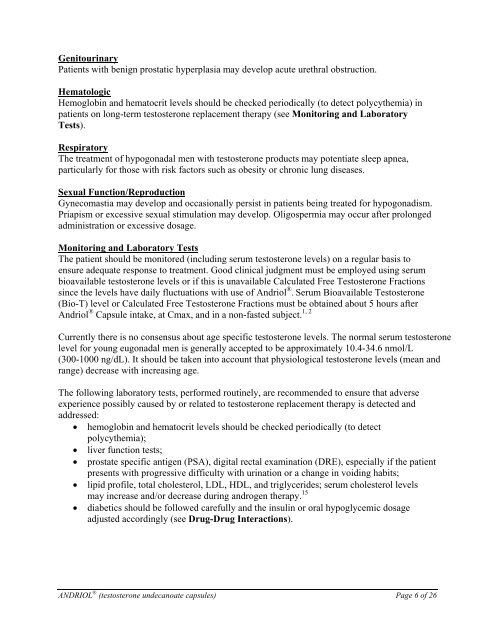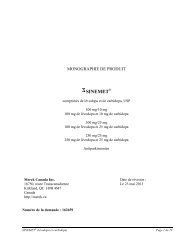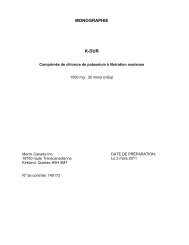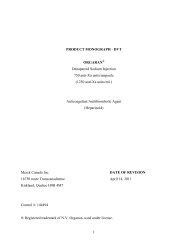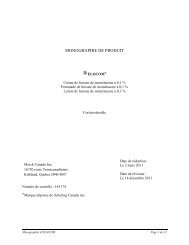PRODUCT MONOGRAPH
PRODUCT MONOGRAPH
PRODUCT MONOGRAPH
You also want an ePaper? Increase the reach of your titles
YUMPU automatically turns print PDFs into web optimized ePapers that Google loves.
Genitourinary<br />
Patients with benign prostatic hyperplasia may develop acute urethral obstruction.<br />
Hematologic<br />
Hemoglobin and hematocrit levels should be checked periodically (to detect polycythemia) in<br />
patients on long-term testosterone replacement therapy (see Monitoring and Laboratory<br />
Tests).<br />
Respiratory<br />
The treatment of hypogonadal men with testosterone products may potentiate sleep apnea,<br />
particularly for those with risk factors such as obesity or chronic lung diseases.<br />
Sexual Function/Reproduction<br />
Gynecomastia may develop and occasionally persist in patients being treated for hypogonadism.<br />
Priapism or excessive sexual stimulation may develop. Oligospermia may occur after prolonged<br />
administration or excessive dosage.<br />
Monitoring and Laboratory Tests<br />
The patient should be monitored (including serum testosterone levels) on a regular basis to<br />
ensure adequate response to treatment. Good clinical judgment must be employed using serum<br />
bioavailable testosterone levels or if this is unavailable Calculated Free Testosterone Fractions<br />
since the levels have daily fluctuations with use of Andriol ® . Serum Bioavailable Testosterone<br />
(Bio-T) level or Calculated Free Testosterone Fractions must be obtained about 5 hours after<br />
Andriol ® 1, 2<br />
Capsule intake, at Cmax, and in a non-fasted subject.<br />
Currently there is no consensus about age specific testosterone levels. The normal serum testosterone<br />
level for young eugonadal men is generally accepted to be approximately 10.4-34.6 nmol/L<br />
(300-1000 ng/dL). It should be taken into account that physiological testosterone levels (mean and<br />
range) decrease with increasing age.<br />
The following laboratory tests, performed routinely, are recommended to ensure that adverse<br />
experience possibly caused by or related to testosterone replacement therapy is detected and<br />
addressed:<br />
• hemoglobin and hematocrit levels should be checked periodically (to detect<br />
polycythemia);<br />
• liver function tests;<br />
• prostate specific antigen (PSA), digital rectal examination (DRE), especially if the patient<br />
presents with progressive difficulty with urination or a change in voiding habits;<br />
• lipid profile, total cholesterol, LDL, HDL, and triglycerides; serum cholesterol levels<br />
may increase and/or decrease during androgen therapy. 15<br />
• diabetics should be followed carefully and the insulin or oral hypoglycemic dosage<br />
adjusted accordingly (see Drug-Drug Interactions).<br />
ANDRIOL ® (testosterone undecanoate capsules) Page 6 of 26


